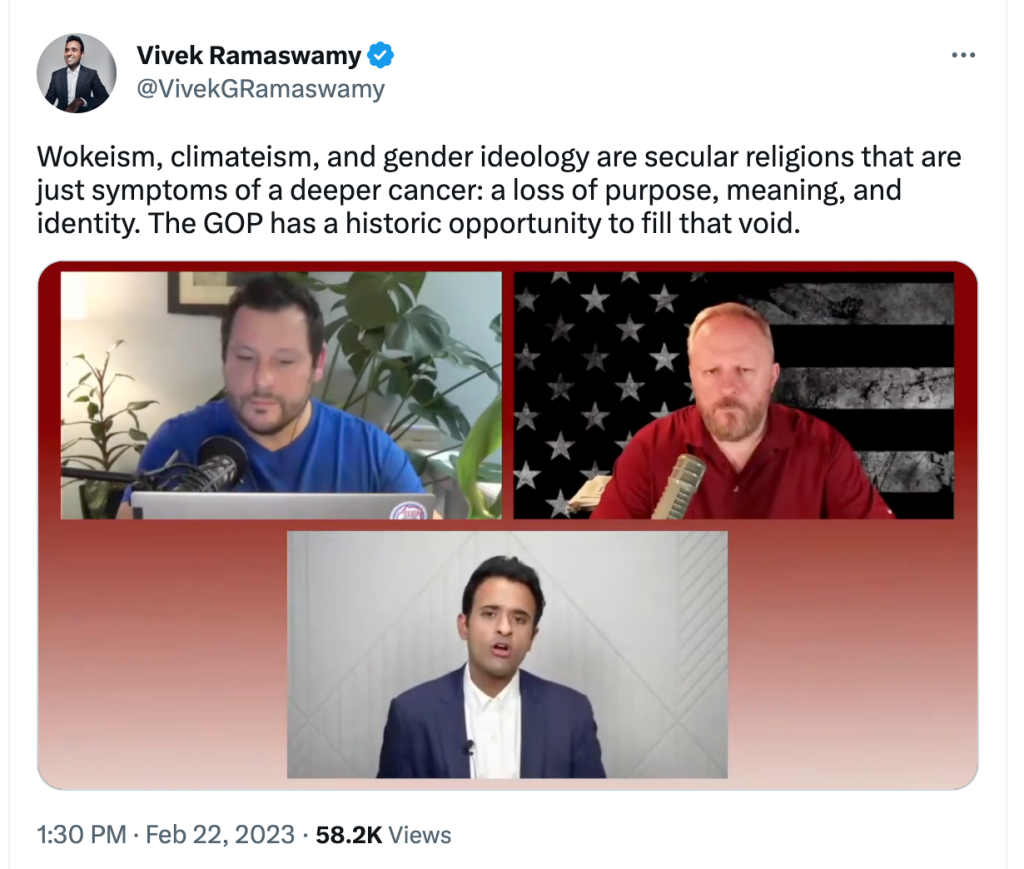
In his announcements last week that he is running for President of the United States, Vivek Ramaswamy employed the language of religion to make his case. Both in his various tweets, interviews, and Wall Street Journal op-ed, the successful businessman coined names for multiple “secular religions” (his term, not mine), including wokism, climateism, and Covidism. He asserted that those ideologies, movements, political positions, or however you want to label them reflect misplaced attempts to find meaning and purpose. Thus, his solution, at least from a rhetorical view, is to replace those “secular religions,” which he presents as false, misguided, and failing, with something better. But I expected that the opposite thing, his solution, would be a non-secular religion (or a religious religion, odd phrases, admittedly, that highlight the complications with the term “secular religion”); however, that is not exactly where he went.

In his contribution to the Wall Street Journal, he opens by connecting these positions that he presents as problematic ideologies with a problem in America, “faith, patriotism and hard work are on the decline.” But, his solution is not religion such as Christianity or HInduism (Ramaswamy identifies as Hindu himself), what most people typically label as religion in common discussion. His solution is “to fill this void with an inspiring national identity.” Our need for meaning can be (properly, in his view) fulfilled by the purpose, and identity that comes from national pride and unity. Scholars have for decades talked about the ways certain ritual practices (e.g., Presidential inauguration, July 4th, Pledge of Allegiance) and rhetorical statements (e.g., “God bless the United States”) function to create a group identity, pride, and willingness to sacrifice for the broader good. Ramaswamy thus embraces another political winner in the US, patriotism.
In his rhetoric, he repeatedly connects religion (the secular religions he dismisses and, by implication, American patriotism) as a source for purpose and identity. This type of definition, as students in Introduction to Religious Studies learn, is a great example of functionalist definitions, as it draws on the things religion accomplishes for the person and community, in contrast to definitions of religion that emphasize a defining essence (e.g., belief in divine beings). Functionalism, however, also provides a mode of analysis of the terms that he uses.
The larger function of his rhetoric, as with much political rhetoric, is to mobilize and inspire people to support his candidacy and movement. His rhetoric attempts to discredit “wokism, climateism, and gender ideology” in several ways. The classification “secular religion” has a negative connotation, suggesting misguided or irrational commitments. This is especially true for his primary audience, GOP primary voters, and that negativity is reinforced by the larger rhetoric of contemporary culture wars over conceptions of gender, diversity, and equality. The power of religious labels, thus, helps to further discredit those ideas and movements he dislikes. The contrast, then, to the meaning, purpose, and identity of American patriotism further reaffirms those “secular religions” as anti-American. The language of religion heightens his attempt to mobilize a particular audience and even expand that audience to others who love America as he views it.
This rhetorical power of the label religion (and related terms) to mobilize supporters is not unique to Ramaswamy or other GOP candidates, of course. All of the assertions about Trump supporters as a cult, which opponents of Trump or the current GOP often use, serve a similar function, to present an opponent as maintaining an irrational, misguided commitment. While in some contexts, labeling something as a religion is a way to authorize the ideas or practices as valuable or even of otherworldly significance, in these uses of “secular religion” and “cult,” describing something as religion serves the opposite, to dismiss practices or ideas as problematic or dangerous. Describing something with religious language is often more about promoting the interests of the person applying the terms rather than applying a simple description. The power of the language of religion is a useful tool to support or dismiss, and this makes studying the discourse of religion both fascinating and applicable to many areas of life, not just that people commonly label as religion.
Photo credit: American flag waving by Mike Mozart from Flickr (CC BY 2.0)